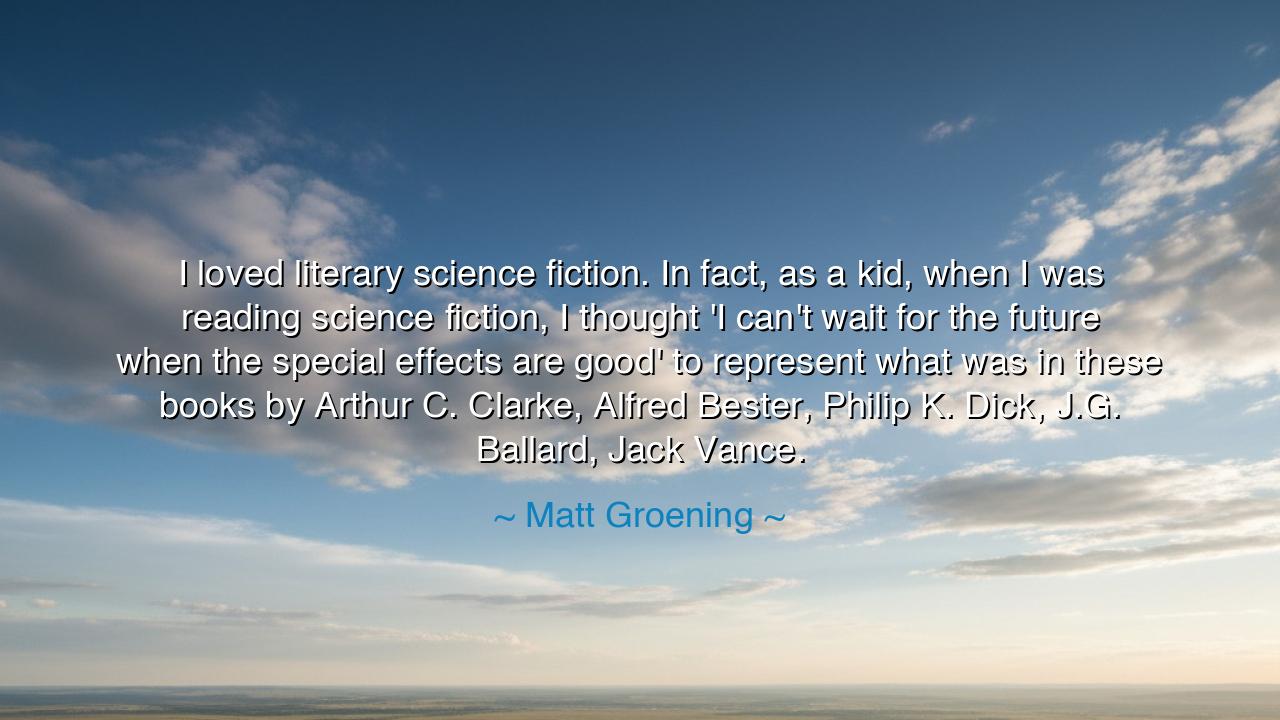
I loved literary science fiction. In fact, as a kid, when I was
I loved literary science fiction. In fact, as a kid, when I was reading science fiction, I thought 'I can't wait for the future when the special effects are good' to represent what was in these books by Arthur C. Clarke, Alfred Bester, Philip K. Dick, J.G. Ballard, Jack Vance.






In the days of old, when the great myths and legends of humanity were passed down by word of mouth, there was always a spark in the hearts of men and women—the spark of imagination. The ancient storytellers, from the Greeks to the Norse, spun tales of gods, monsters, and worlds beyond the stars, painting pictures of futures far beyond their time. These stories, though rooted in the mythological, were not merely flights of fancy—they were glimpses into the deeper desires and dreams of the human spirit. Matt Groening, the modern-day creator of the beloved series The Simpsons, echoes this ancient longing when he says, "I loved literary science fiction. In fact, as a kid, when I was reading science fiction, I thought 'I can't wait for the future when the special effects are good' to represent what was in these books by Arthur C. Clarke, Alfred Bester, Philip K. Dick, J.G. Ballard, Jack Vance."
Groening’s words reflect a truth that resonates with the human condition: the longing to shape the future and to bring our dreams to life. Just as the ancient builders of the pyramids sought to create monuments that would last for eternity, so too did the writers of science fiction dream of a world where the boundaries of the possible were expanded, where the imagination could transcend the limits of its time. Science fiction, with its wild visions of the future, represents not just a genre of literature, but the very essence of humanity’s desire to reach beyond the stars, to grasp the impossible, and to turn it into something real. Groening, as a child, could feel this connection between the fantasy of the written word and the promise of technology, knowing that the future would one day make those dreams tangible.
The writers Groening mentions—Arthur C. Clarke, Alfred Bester, Philip K. Dick, J.G. Ballard, and Jack Vance—were not just authors; they were visionaries. Clarke, with his thoughts on space exploration and advanced technologies, offered visions of a future where the impossible became everyday reality. Bester, with his groundbreaking work in psychological science fiction, explored the boundaries of the human mind and its potential. Dick, known for his exploration of reality and identity, challenged us to question the very nature of existence. Ballard, with his dystopian worlds, showed us the darker side of technological progress. And Vance, through his cosmic adventures, painted worlds where the boundaries of space and time were constantly shifting. Each of these authors captured a fragment of the future, piecing together a world that was yet to be. And yet, as Groening saw, the true potential of their visions was not realized until the technology of special effects could bring their creations to life on screen.
This yearning to bridge the gap between imagination and reality is not unique to the modern age. The ancient Egyptians, with their mastery of geometry and astronomy, dreamt of building tombs that would not only house their dead but connect them with the stars above. The Greeks, with their gods and mythologies, envisioned a world where humans could transcend their earthly limitations and become something more. Groening’s excitement about special effects is an extension of this ancient desire to turn dreams into tangible reality. Just as the ancient pyramids were not just tombs but monuments to the future, so too is science fiction a monument to what could be—if only the tools of the present could catch up to the dreams of the past.
The lesson we learn from Groening’s words is one of hope and determination. When we read the works of science fiction or gaze at the stars, we are reminded that the future is not something that happens to us; it is something we create. Just as the ancient builders looked to the heavens and saw a future that they could shape with their hands, so too can we, through technology, bring the dreams of writers, philosophers, and dreamers to life. The impossible is only a reflection of the unknown, and with enough creativity, vision, and technology, it can become the possible.
In our modern age, just as the great philosophers of ancient Greece challenged the mind to think beyond the known world, we too must challenge ourselves to push the boundaries of what is possible. We must embrace the technologies that are available to us, recognizing that they are not just tools for convenience, but vehicles for the dreams of those who came before us. The special effects that bring science fiction to life are not just for entertainment—they are a glimpse into the future, a glimpse of what we can build with our own hands. Just as the ancients left us wonders to admire, we too must leave behind a future that will inspire those who come after us.
Thus, the practical action we must take is to embrace our imagination and creativity, to look at the world around us and ask, “What can we create?” Just as Groening saw the potential for technology to bring science fiction to life, we too must see that the future is not some distant, unattainable dream, but a reality waiting to be built. Through the power of technology, art, and vision, we can shape a world that honors the dreams of the past while creating the wonders of the future. Let us, like the ancient builders and modern dreamers, build a world that not only reflects our highest aspirations but brings them to life for all to see.






AAdministratorAdministrator
Welcome, honored guests. Please leave a comment, we will respond soon